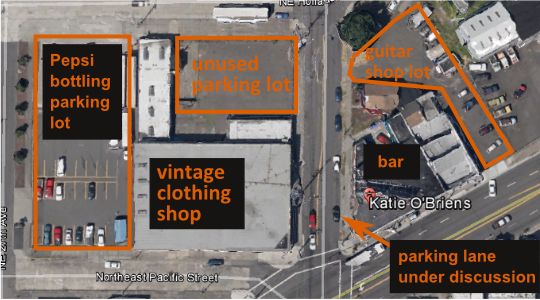
(Graphic: BikePortland)
There’s one section of 28th Avenue’s commercial strip, at the heart of the planned 20s Bikeway, where it’s not possible for bike traffic to divert onto a side street: the one block between Sandy Boulevard and Interstate 84.
The city had initially planned to remove street parking from one side of 28th Avenue here to make way for a buffered or protected bike lane (see graphic above). But that proposal has drawn criticism from Katie O’Brien’s, a bar that has operated at the corner of 28th and Sandy since 1930 without any on-site auto parking of its own.
So in order to keep preserve some free on-street parking for Katie O’Brien’s, the city is now proposing to narrow a 12-foot sidewalk by four feet and keep the new bike lanes to five feet each, which is the city’s minimum acceptable standard for bike lanes. One bike lane would run in the door zone of the on-street car parking.
The $30,000 curb relocation would be covered as part of the $2.4 million federal grant for the 20s Bikeway, which will be the first on-street bikeway to run the full length of the city from north to south.
The city’s plan would preserve “about six to seven spaces,” project manager Rich Newlands said in an interview last week. That’s a bit more than half of the block’s current parking.
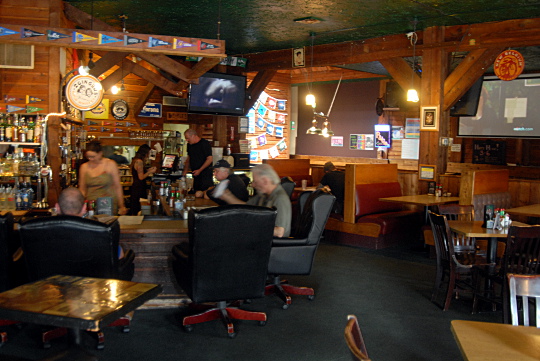
Katie O’Brien’s general manager Cynthia Fox said in an interview Monday that an increasing share of the bar’s customers walk over from homes and businesses in the rapidly developing area, but most arrive by car.
“I have a group of older guys, where the youngest one’s like 68, who come here Monday through Friday,” Fox said. “There are about 12 of them. One has gout pretty bad, so he has to park here by the door.”
There’s no street parking on Sandy, so removing parking from 28th would require such customers to walk a block or two, perhaps further. Fox said that may not sound like much but is a burden to many people.
Fox said she wrote a letter to Mayor Charlie Hales to protest any removal of on-street parking on 28th. Between a hike in the water/sewer bill, a new permit proposal for businesses open after 10 pm and a proposed transportation user fee, Fox said, “it’s a tough city to do business in.”
Business at Katie O’Brien’s has been growing steadily in the last few years, Fox said.
“Five years ago we were saying, ‘What will we do to get people to come here?'” Fox recalled.
After the 2003 transfer (PDF) of Sandy from state to city oversight, the city secured $7.9 million from the state to repave Sandy, widen its sidewalks and add crossing lights and other walking and biking improvements. The work finished in January 2007. In the 2008 recession, Fox said, several car dealerships on the street closed and are now being replaced by retail shops. The resulting foot traffic has brought a steady flow of customers and (thanks also to a change in ownership around the same time, she said) the bar no longer has “a freakout at the end of every month” over making payroll.
Advertisement
A few years ago, Katie O’Brien’s declined two offers to pay for parking space in its neighbors’ lots.
Fox said that Centaur Guitar, two doors east of the bar, offered $100 per parking space per month, which she considers high but not unfair. Across the street, she said, Hollywood Vintage had offered what she remembered only as a “ridiculously high” price to let bar customers park in the fenced lot that sits unused behind its building.
“We didn’t really need it back then,” Fox said of the decision by her boss, the bar’s owner, to turn down both offers of extra parking.
But that was before the city said it was planning to replace the free parking spaces on the street with new bike lanes.
Fox says Katie O’Brien’s is “not anti-bike” — she rides herself and most of her employees commute by bike, she said. She believes the best solution would be to narrow the sidewalk areas and remove the buffers between roadway and sidewalk, where utility poles and patches of grass are today.
Minus the utility relocation, that’s basically the city’s plan. The $30,000 curb relocation comes out to about the same cost as a traffic diverter.
“About 6-7 spaces could be retained on southern half” of the block, project manager Rich Newlands said in an interview. He said the west side of 28th was a better candidate for sidewalk removal because “Hollywood Vintage has nothing facing the street there.”
If Katie O’Brien’s had accepted the parking lot sharing offer from Centaur Guitar a few years ago, it would have been paying $7,200 a year for six parking spaces. Since then, medical marijuana dispensary Collective Awakenings has opened next door and rented all of Centaur’s spare parking spaces.
Newlands said a five-foot bike lane alongside parked cars is “meeting our standard,” but that if the city’s engineer allows an exception to the 11-foot standard lane width, there might be room for a 6-foot bike lane on each side.
Meanwhile, Hollywood Vintage’s 7500-square-foot parking lot remains fenced and empty. Fox said she isn’t sure why, and wishes that Hollywood Vintage owner William Hicks would open it up for parking at least for his own customers, which might open more space on the street.
Hicks, who said he’s paying “thousands of dollars” to rent the empty lot, said Monday that he believes “the city is short thousands and thousands of parking spots” because of new developments coming in without off-street parking, and that “a parking lot that would fit 10 cars is not going to solve that problem.”
“I think it’s a big waste of time to worry about a parking lot,” he said.
Fox said she thought the unused lot could fit 30 cars. My own estimate was about 15.
Bicycle Transportation Alliance advocate Carl Larson said the city’s proposal is adequate for biking, with the higher cost falling on the quality of walking.
“There are a lot of compromises on that route, and we have discussed our displeasure at them,” he said. “The 5 or 6 foot bike lane is, you know, okay. Not world-class, but this is not yet a world-class bikeway.”
Incoming Oregon Walks Executive Director Noel Mickelberry said she’s not aware of any city projects in recent history that have prioritized both bike lanes and on-street auto parking over sidewalk space.
Newlands, the city project manager, said the city’s proposal is “not a great tradeoff” and “not anywhere close to final.” But he said the city sees spending $30,000 to preserve free on-street parking next to an unused parking lot as the best available alternative, because it has no way to compel private businesses to make a deal.
“This is not a land-use case,” he said. “We have no ability to directly help.”



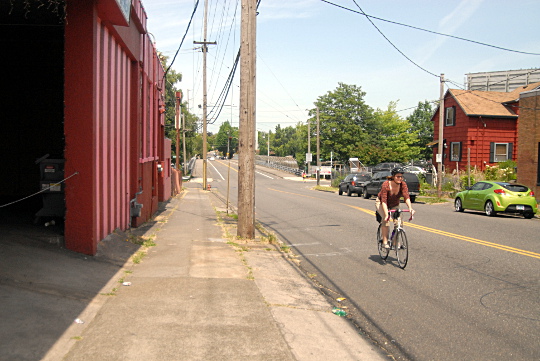
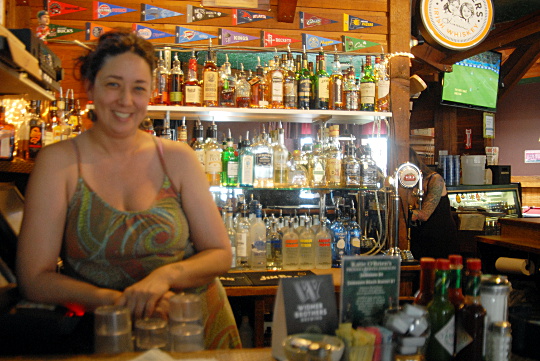
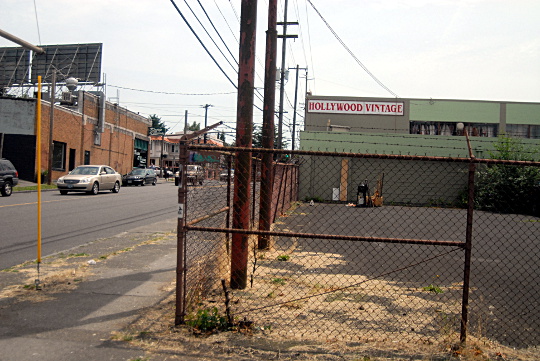

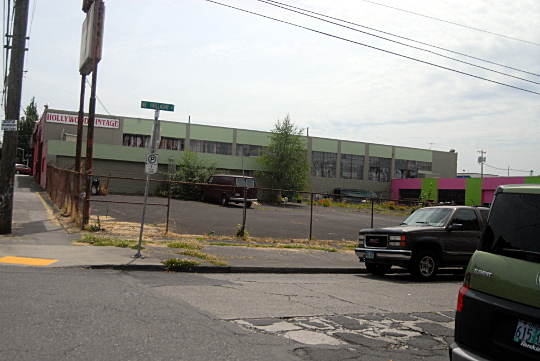

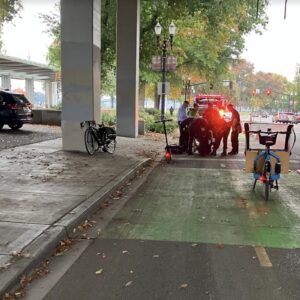
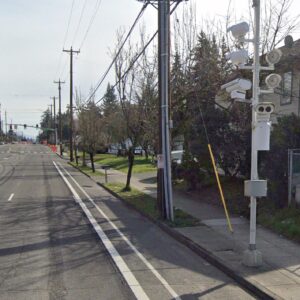
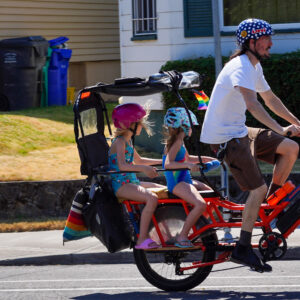
Thanks for reading.
BikePortland has served this community with independent community journalism since 2005. We rely on subscriptions from readers like you to survive. Your financial support is vital in keeping this valuable resource alive and well.
Please subscribe today to strengthen and expand our work.
Find me a city that’s not “a tough city to do business in.”
It’s really all that hard in THIS city? If you open a business in Portland the city will roll over and give you free on-street parking.
I’m done. The city had just given up, hasn’t it?
voters elected business/developer sycophants and got a city government that cannot bend over enough to cater to the desires of “free market for me but not for you” biznis people.
who could have known?
We just got downgraded from platinum to lead. As in, rhymes with dead.
No. Do not use money to resize the sidewalk for one block because of 7 parking spaces. This is for one business. Take the parking spaces away and move on to the next part.
And people get up in arms about the money spent on a bike lane that will be used by hundreds of users per day and here we are ready to kowtow to someone that doesn’t want her seven free parking spaces taken away? And on top of that, to allow for those seven, again free, spots, we have to make a doubly-unsafe bike lane (pinched and in the door zone).
To quote:
And business will continue to grow with the improvements of 28th Ave and gentrification of Sandy in the area. Put up or shut up on those free spaces. $100/month offered for those spots from the guitar shop were a bargain for a business wanting to offer free parking for its patrons – which they passed up – and now we’re supposed to compromise road user comfort and safety for bicycle riders and pedestrians alike?
A guy whose business has no off street parking for customers thinks apartments with no off street parking are a problem. Pot kettle black.
Read that paragraph again. William Hicks, the owner of Hollywood Vintage and the big empty parking lot, made that statement about the lack of off-street parking and apartments. Cynthia Fox is the GM of Katie O’Brien’s and they do not have any off-street parking.
Nevermind, he’s got a parking lot that he won’t let customers park in. What a pot.
Rich has asked for an endorsement of the project from a committee I am on. This issue is one of my main concerns. There is also no diversion between Regents and Holman on NE32nd, nor at 30th and Burnside, I am in the process of writing my own letter to him. He has a very difficult job, but do not think I can not vote for an alignment that preserves the 25 parking spaces between between Oregon and Wasco.
He specifically stated that PBOT wants to built a route for the 8 to 80 group. This currently is not one. Sacrificing pedestrian space in a city with sketchy sidewalks much of the time is not a good idea. If they are going to do that, then they need to cycletrack it like on NE Cully. We could then remove the parking spots later when the clientelle changes.
Thank you for your help Terry.
http://www.komonews.com/news/local/City-approves-citizen-made-bike-lanes-helps-implement-more–217682931.html
Remind me again why an establishment that principally serves alcohol should be catering to people that drove there?
The city’s first priority should be preserving street parking so people can drive to bars and then drive home after a few drinks. It’s called “livability”. /sarcasm.
why should bikes be any different in that case, then?
The bike route has other destinations in its 8 mile passage than this particular bar.
Legally, there is no difference. Ethically, there is a huge difference. The amount of destruction and mayhem that someone can cause with a 4000lb vehicle capable of 100+mph speeds is several factors higher than what someone can do with a bicycle.
They have that vintagy old-time diner breakfast too! I used to eat there every week, and never consumed alcohol.
But it’s ok for someone to drive to a pot dispensary?
comparing a bar and a pot dispensary isn’t fair. people go to dispensaries to buy pot to consume later at home. they go to bars to drink, not to buy alcohol to consume later at home. it would be more accurate to compare a dispensary and a liquor store. i imagine fewer people would be uncomfortable with a liquor store wanting to provide parking for their customers than they are with the bar wanting to make it easier for their patrons to drive there.
Really? How many “my back hurts” people with medical pot cards are waiting to drive home before lighting up?
Riding on the streets here in the bay area, I’m absolutely amazed at the number of times I’m passed by cars with pot wafting out, at all hours of day or night. There’s been many occasions the car looked like it was straight out of a Cheech and Chong movie! Yeah, people smoke their weed at home just like they go to Katie O’Brien’s for the fine cuisine…
Looks like being under the influence while driving is still a crime.
Unbelievable. I guess after several drinks it is important for your car to be parked close or you might not be able to find it.
I’m not “anti-Katie O’Brien’s”…
but I will not support a business that after taking advantage of 80+ years of free on-street parking, bitches about paying taxes.
“The resulting foot traffic has brought a steady flow of customers …”
“PBOT has proposed to narrow a sidewalk by four feet…”
Let me get this straight–they are preserving/adding parking to make it easier to get to a BAR!!!!???? Sounds like PBOT is aiding and abetting drunk driving.
Yes, and even the example that the bar owner uses (and it is questionable to pick out a specific customer) is a terrible one. I am pretty sure that alcohol is contraindicated for people undergoing treatment for gout!
Basically what she is saying is that there is a regular group of daily drinkers who are not able to walk one block, yet she wants behind the wheel of a car after consuming a few beverages. It seems completely perverse to protect the convenience of those people over the safety of the whole.
I’m not sure the customers she mentions are buying alcohol. They’re having breakfast or lunch.
Yeah they are a bunch of old crumudeony guys who eat breakfast there literally every day. I used to enjoy listening to them banter when katies still had their cheap breakfast deal, but I don’t think any of them are drinking when they meet up down there.
But drunk biking is okay?
Riders on the 20s bike route have other destinations than this bar.
I think you’d be hard-pressed to find someone who says it’s “OK”. However, I for one can tell you that if I had to choose between being hit by a drunk on a bike and a drunk in a car, I’d pick the drunk on the bike every time. You seem to dislike bikes, so you might pick the car, but I think that most people would not agree with your choice.
As I’m sure you’ll recall, several months ago Steve Novick channeled Richard Sherman and dubbed the current city council, “The Council of Boom.”
Given both the dependence on automobiles by the council members themselves the nauseatingly auto-centric policies of this council, I would humbly suggest they alternatively consider the moniker, “Council of Vroom.”
When the city says they can’t force a property owner to rent out their parking spaces that is true. However if they continue to undercut the value of those parking spaces by offering free spaces directly across the street they reduce the likelyhood that the owner will rent the spaces. Apparently he isn’t willing to do so for 100 dollars per month, but maybe he would be at 200, but why would the bar pay for parking for their patrons when they are already getting it for free from the city?
The utility relocation will be the most expensive part of the project – how much is the project including the utility relocation costs? They are misleading us with the $30K cost without utilities. Anyone at PBOT and ODOT knows utilities are a very costly component to street projects. What is the REAL cost?
At that price I’m pretty sure the utility poles won’t be relocated – presumably they’d bump the sidewalk in and out around them. The utility relocation was Fox’s idea, not the city’s proposal.
I’m not sure you can do that and meet standards. It seems the utility poles would be vulnerable to being backed into and that they could become a safety issue. But, I am not an engineer.
Utilities occupy public rights of way by franchise agreement. As such, the utilities pay to relocate their infrastructure when the City modifies the right of way and the utility’s infrastructure is in the way (or the city caves and adjusts it’s plans).
I believe the public agency pays to have them relocated.
$30,000 for 7 spaces is $4,285 per space. What is the public benefit of this expenditure?
None. It’s business subsidization. It just blows my mind for businesses to rail about how important parking is to their business and then not want to spend the money to guarantee their parking.
It’s an example of why to be careful of allying with the business interests in their opposition to the street fee unless they commit to supporting an alternative, rather than just using legitimate opposition to the funding structure as cover to avoiding paying their fair share.
That 12 foot sidewalk should have street trees in the 4 feet neat the curb. If its narrowed to 8′ ( below city standards for sidewalk corridor) then it can never have trees or cafe tables, and poles will narrow the walking area to less than 6 feet.
It could have street trees in short curb extensions like the ones on Davis between 7th and 8th.
This projects runs from approximately the 7000 block of NE 27th in Concordia to the 7800 block of 27th in the Reed area (not counting the parallel greenways etc.). That is nearly 15000 blocks. Spending 1.25% of the overall budget on one block out of 15000 is excessive. I would encourage the city to find a different solution.
For example, it was mentioned in the article there is no parking on Sandy. Perhaps one solution to this would be a road diet on sandy, which would put a bike lane and parking adjacent to this bar. Sandy certainly has room for a bike lane on both sides, 3 lanes and a lane for parking.
15,000 blocks? A block is allotted 100 building numbers, which means that there are 148 blocks between the 7000 block of NE 27th to the 7800 block of SE 28th. 1.25% of 150 isn’t so farfetched at all, when many of the blocks are in residential neighborhoods and likely need little investment besides pavement sharrows and (perhaps) wayfinding signage.
Yes 148 blocks. The entire route has one potential diverter thus far at 28th and Holgate. NO other diverters are even planned. Perhaps this money would be better spent putting one diverter at, say Belmont and 28th.
Planned Greenways are absolutely worthless without diverters. For me Michigan has been consistently more dangerous than riding on Interstate.
I think we should consider the potential for this bikeway to actually hurt biking in Portland as it has used money to postpone actual improvements: diverters, and bike lanes. In the end we can measure this plan on those two things.
+1 on diverters, the biggest difference between the greenways in Vancouver BC and Portland are that theirs now have a lot of diverters, that and HAWK style signals. They make a big difference.
YES! I often make this comparison. I really enjoy the greenways of Vancouver, BC. Some are located in extremely dense parts of Vancouver, BC, and somehow the City had the guts to do the right thing and it is pure bliss.
To make this project and all past and future greenway projects more successful, we need so many more diverters.
*** I encourage folks that agree that more diversion should be in place along this route to write Rich and express your thoughts to him in a friendly way: rich.newlands@portlandoregon.gov ***
Actually Two diverters since they are not planning on adding north-south conductivity at Powell for cars. The rest of the “diversion” from this route comes from it meandering all over the place…..like the greenways of North Portland.
According to the south map, there is only a HAWK beacon at 28th, no diverter. Cars are allowed to enter 28th going North I think. Was there talk of a diverter here?
They can enter from Powell yes, but not north-south Across. The left turn pocket to head south they would most likely eliminate. They also will not remove the median island, so the number of cars will be minimal.
What will prevent cut-through traffic at 28/29th and Stark, 27/29th Hawthorne? Why not have auto traffic use 30th? Give bikes some ROW or there will be no reason to use this.
These decisions in particular, where there is a clear precedent for safety, confuse me the most. What makes this a greenway other than the map and why should I use these streets?
Nothing will prevent cut throughs north of Powell. In fact, once the stop signs are flipped all the locals will use it. As they will in NE when 33rd is congested.
I am proofreading my letter to Rich as I type.
So, just to be clear, this business owner is saying that the business requires a public subsidy (in the form of “free” street parking) in order to survive.
Is it any different if a store uses a bike corral on a public street?
Yes, because a bike corral can accommodate 12 vehicles and encourages a form of transportation that reduces damage to the roads.
“About 6-7 spaces could be retained on southern half”
Yes, it is different, unless you’re talking about stores using nothing but bike corrals on public streets.
Actually I’d say no. When the space we need to secure safe lanes for users is in this hard to find, I think it is as inappropriate to put a corral in as it is to maintain the on street parking.
Good point, and unlike cars bikes can be parked on the sidewalk – unless they narrow it too much.
bike riders will walk a few blocks…
Not me, I want to park inside.
“this business owner is saying that the business requires a public subsidy (in the form of ‘free’ street parking) in order to survive.”
…after noting that the recent upgrades have revived her business due to the increased FOOT traffic.
Why on earth is Hollywood Vintage renting an empty lot that they aren’t using? There has to be something else going on here.
It might be part of a package deal in their lease, itemized but not separately rentable.
The Hollywood Vintage owner said he’s considering eventually opening the back lot for his customers to park on. The bar manager said that’d be great with her if he did, because it’d free up more spaces on the street.
It’s also entirely possible that Hollywood Vintage or its landlord have some other reason not to use the lot for parking, and just didn’t want to talk about it. I have no idea.
“Let’s shrink a sidewalk and make the city less walkable to make it easier for people to drive their cars to a bar.”
– Portland Oregon, Platinum City
Can we petition to have Platinum revoked?
“We are already struggling with the number of cars we have in the streets of our cities; congestion, air pollution, road safety issues, health impacts from people driving all the time,” said Luc Nadal, technical director for urban development at the Institute for Transportation and Development Policy (ITDP). “This is an absolutely unsustainable development model.”
found here:
http://www.scientificamerican.com/article/car-truck-and-airplane-pollution-set-to-drive-climate-change/
Well unlike some of the other 28th petition signers, this establishment is an easy boycott…
“Between a hike in the water/sewer bill, a new permit proposal for businesses open after 10 pm and a proposed transportation user fee, Fox said, ‘it’s a tough city to do business in.'”
Contrast the above assertion with:
“Business at Katie O’Brien’s has been growing steadily in the last few years, Fox said.” … “several car dealerships on the street closed and are now being replaced by retail shops. The resulting foot traffic has brought a steady flow of customers and (thanks also to a change in ownership around the same time, she said) the bar no longer has ‘a freakout at the end of every month’ over making payroll.
The old “tough place to do business” trope coming from certain business owners in this city is getting really old. I don’t think anyone paying attention takes it seriously anymore; it’s obviously just a negotiating tactic. And a bit of a dishonest one IMO.
Plus, Katie’s appears to be actually benefiting from changes that are making the surrounding area more walkable. Discouraging nearby neighbors from walking there by narrowing the sidewalks, for the benefit of people driving from further away, is not a good solution.
I feel like the 20s bikeway project has become a total charade. There is a stated goal of supporting the “8 to 80” but no roadway improvements to support that. What we do have is facilitating drunk driving by prioritizing motor vehicle parking in front of bars. Who can support that with a clear conscience?
Pedestrian improvements are part of this project too. What we have instead is cutting back the sidewalk to make more room for cars? Aren’t we done widening the street for cars?
In case you were under any illusion over who gets priority on the bikeway project, just witness this proposal to shove the bikes onto the sidewalk. Who can say this is an improvement for either mode? There is a lot of smoke blowing going on. Push it away and look a little deeper.
Removing a few parking spaces is not simply a question of “balance” or “trade-off.” Should public safety be traded off for motor vehicle parking in front of bars? Is that a balanced and fair? There is no 1 to 1 relationship there. It’s completely unequal. It’s a false balance.
Who else watched all of the bike-tasked PBOT staff sit on stage with the Green Lane project and say, even Rob Burchfield said so when I asked, that the physically separated bike facility is now the preferred facility to provide safety for people traveling by bike? That seems like a long time ago now. Where have we seen this actually applied to new projects? Why do we see not see that as the main feature in the 20s bikeway?
There are stories of Portland and it’s Green Lane failures here:
http://bikeportland.org/2013/12/04/guess-who-didnt-make-list-of-americas-top-10-protected-bikeways-98091
The “8 to 80” statement is a red herring to distract people from the fact the new “preferred” treatment appears almost nowhere on the route. The treatment proposed for the length of the route is simply more of the same old non-treatments – share the road. It puts kids and older adults and everybody into a fend for yourself mix with motor vehicle traffic and often on narrow backstreet travel lanes which puts people in direct conflict with the oncoming car traffic, delivery trucks, trash trucks, etc. What is the “8 – 80” character of this?
This totally contradicts stated safety guidelines and policy directives.
Have a read of the grant application and you will see that “8 to 80” is not mentioned at all. Actually, the directness of the route and it’s ability to connect with other routes while removing parking have significant and proven benefits. Read it from Metro:
http://www.oregonmetro.gov/regional-transportation-plan
I for one am sick of being lied to and seeing the goals of this project constantly discarded.
Don’t be fooled by people selling false improvements. Demand real improvements!
Thank you for this comment! Spot on…
Portland, unlike many other better managed cities, seems to have almost no accountability for actually implementing policy and planning that has been conducted over the past 10-20 years in improving alternative transportation. What we do get is a lot of hype and PR boosting from elected officials (all of whom drive) and city agencies, who then do nothing but backpedal on these promises.
Frankly, as a resident of Portland and a votes, it is simply embarrassing. What is the point of all the planning exercises and policies if they are simply going to be ignored? Why do citizens in San Francisco and Seattle succeed in suing the city to make them actually follow policies, while we get a lot of backroom and closed-door decision making?
I agree that we need to do a whole lot more, and some days it seems like we are currently moving at a glacial pace. It frustrates me greatly.
However, it is good to keep in mind that those other cities you mentioned have also had their share of hiccups. For example, San Francisco had their whole recent debacle where citizens brought forward a lawsuit claiming that bike lanes may actually cause more pollution. From what I’ve read, I believe that this caused San Francisco to be in a holding pattern for more than three years where they didn’t have the ability to implement much of their bike plan. Crazy, right? You can read more here: http://www.sfcityattorney.org/index.aspx?page=18
Stuff like that, whether it happens in our city or other large cities, is just absurd given our current climate challenges and knowledge that pollution doesn’t stop at the border of our own city. We need to do more, faster. All of this pushback reminds me of one of my favorite quotes:
“Those who say it cannot be done shouldn’t interrupt the people doing it.”
Hear, hear!
These statements don’t so much seem like your feelings to me as they do facts. We haven’t seen any significant improvements to the bike infrastructure in this city for a good few years (maybe the last 6 or so?), and as a result we’ve seen mode share flatline.
This is just disingenuous. We have seen plenty of improvements, they just might not be in areas that we all use all the time. The 50s bikeway is being striped as we speak. The separated Cully, Moody, and Multnomah cycle tracks have been added. Barbur has had some buffering of it’s bike lanes. Underpass of 205 path at Division. Addition of bike lanes on Division (and soon to be Foster). These are just a few off the top of my head. Sure we haven’t seen game changing, huge projects, but there have been improvements (I would argue them to be significant).
A cycle track is to get from point A to point B, not like an overpass or a bridge and certainly not for pedestrian space stealing rip offs.
Sure there are a few token blocks of buffered bike lane or cycle track out there, but you can’t get anywhere on them by themselves. I’m in favor of any improvements, but not lies about how the treatment provided is intended to meet the stated goal. It doesn’t.
Making a route safe and comfortable for the 8 to 80 doesn’t mean risking you neck for 5 miles to ride on a few blocks of buffered bike lane or a wrap around porch sized cycle track.
That’s not a systematic approach to safety. It’s a showcasing of different treatments, which is fine for if what you’re doing is proof of concept stuff. These proof of concept pieces are disconnected from a whole that would actually encourage people to ride. Remember the PBOT staff said the physically separated bike lane is now the *preferred* treatment, which means we should see it as the main feature of new bikeways, not some kind of handout or consolation prize for the fact that the route treatment overall is totally not serving the stated goals.
But do you expect this stuff to all be built over night simultaneously? My point was that while many of us might not be happy with the pace improvements are being made, they are in fact being made.
I think the thing is Daveness, that it seems pretty consistent that what is getting done is the easiest, least necessary and lowest impact improvements. Let me try to explain what I mean by that.
It is simple that most streets, in most blocks in Portland (or in my Vancouver) are just fine for bikers and walkers. Sure, adding sidewalks to a quiet street that lacks them, is a big improvement for walking relative to that specific street, but it doesn’t really add much walkability to the neighborhood as a whole, much less the whole city. What is required to bring cycling and walking up to a new level of usefulness is not simply incremental improvement where routes are either already reasonably useful, or alternative routes exists (routes being something different that shuffling back and forth between a selection of streets avoiding hazards). It is precisely in two areas that critical improvement need to be made to capitalize on the assets that exist and the improvements being made. First area is access to commercial corridors and destinations within. Second are is key corridors connecting between natural or manmade divisions in the city: crossing freeways, rivers, gulches, blocks of real-estate blocking routes (cemeteries, Loyd Center Mall for example).
That is exactly where we see a very clear pattern of the City and PBOT caving in to “car head” and not making virtually any improvement for the past several years.
In project after project, Williams, Foster, 20’s bike way, at the critical intersections where the MOST need for improvement exists and on the critical road stretches where there are the most destinations, and the most benefit to REAL improvement, the City and PBOT have consistently, nearly 100%, ended up deciding to preserve lanes and parking, vs. making the larger improvement pedestrian and biking facilities.
That is exactly the problem once again in this case. Most of the 20’s bike way is ALREADY reasonably rideable. Same with the 50s by the way. It is key stretches, short stretches of a few blocks in just 3 or 4 areas, and a half dozen key intersections that make the route intimidating and more dangerous than it should be. It just doesn’t make that much difference to improve the 85% of the distance that isn’t really bad, but then drop the ball and not provide real, significant improvement in exactly those places where it is most needed, and faces opposition.
Couldn’t agree more on almost everything you said (I was vehemently against the diversion of the Foster lanes at 54th). I just don’t think we should be surprised and disgusted that in a city that is supposedly so strapped for transportation funding that we are only seeing the easiest (cheapest) improvements right now.
But you are right we should dream big (just not get crushed when those dreams aren’t always realized).
Very succinctly put, Paul. Thank you!
Great, now we have an excellent metric as to the value of free on-street parking spaces: $6,000 per space, or about $6k/150 ft^2 = $40/square feet.
Oops, math is wrong.
6 spaces: $5,000 per space = $33/square foot
7 spaces: $4,286 per space = $29/square foot
Agreed. Now spend that money on using eminent domain ro buy the unused parking lot. Then charge for parking and make money. Easy.
(1) PBOT buys abandoned parking lot
(2) rezone as “street”
(3) paint parking spot lines
(4)……?
(5) Profit!?
Ben Schonberger shared an interesting idea on Twitter: instead of spending this money to narrow the sidewalk, spend it in a cash payment to the adjacent business as a “transition fee” for the inconvenience of removing nearby street parking. I don’t know if that’s legal or anything but it seemed smart.
https://twitter.com/SchonbergerBen/status/481537288929677313
This whole situation is so absurd. It would be funny if it didn’t affect our safety and well-being. It is a perfect example of why the city can’t give away street parking for free. It alters the free market, and prevents good business practices and smart investment.
Don’t impose a street fee. Just start charging for street parking city-wide. I will pay for the two cars we keep on the street right now. In fact, if the city starts to charge for parking, I will probably get rid of one of them.
Why pay for something you can get for free?
That’s why this shrewd business decision has happened, is happening and will continue to happen in the future. Millions, billions of times.
What is really the down side to them having delayed a purchase of off-street land for parking? Increased real estate costs? In the interim they don’t pay property taxes or rental fees while waiting on the lottery where the city gives away public resources for no cost. They didn’t even have to pay for an “on-street parking” lottery ticket.
Location, location, location: it looks like gentrification will have robbed them of theirs in the next few years of high density infill.
I have sympathy for the plight of the people thay work there but I have no sympathy nor nostalgia for the 1950’s “American Graffiti” land use paradigm that they seem dependent upon.
In Chicago and D.C. you pay yearly for parking tag to park on the street.
Guess what those two cities have in common with Portland?
It’s a great idea but I wonder what today’s hearing would be like if THAT was the proposal.
Now would the full cost of this ($30K… yeah, right) still go towards the 1% figure required by the bike bill, or would that budget then be pro-rated by the costs of the parking spot installation? Or will one of those spots contain a bike corral?
A sub-standard auto lane width deviation here would slow traffic some, but also may create the possibility of bike lane buffering.
Well, Hales better show up at my house tonight with a TV reporter and $300K!
🙂
If they put in meters on that block to pay for the cost of maintaining unneeded parking I am betting that nearly all of Katie’s customers would park around the corner and walk, because anyone who looked at the cost/benefit for this project wouldn’t want it if they were spending their own money. There are plenty of nearby spaces including a bunch on Holladay. Part of the issue is the idea that a business will go under if people can’t park within 100 feet, which just isn’t true.
don’t forget – there’s that one guy/week with gout who might have to skip out on his weekly shindig. I think that right there is worth a $30,000 subsidy.
The city could buy him a Hoveround for 1/10 of that price…
Would the city be so willing to sell out cyclists if critical mass was still around?
agreed…CM did good, but the work was never truly finished.
If the city narrows the sidewalk on the Hollywood Vintage side of 28th because they have “nothing facing the street there”, what happens when the next business who rents that space wants to put out cafe tables, or even wants to plant street trees? “Sorry, the previous owner wasn’t using the sidewalk fully at the time, so we narrowed it.”
And now all future businesses will have to live with the results, not to mention those who walk by there.
Sounds like Division Street, where some planned swales were deleted or narrowed, in order to preserve the 12′ sidewalks, because the adjacent business had cafe permits. When asked about other locations that may want them in the future, staff said they’d only keep the wide sidewalks for those who currently had cafe table permits. Other future cafes? Too bad. (My thought is that swales belong around the corner on the residential streets where there’s not as much demand for sidewalk and street space)
PBOT (and BES) often do not seem to think beyond end of the project they’re doing now.
Swales on arterials are good not only because they capture more runoff from the larger street area, but also because there is more traffic and thus more pollutants that can be filtered.
Thank you Doug! Narrowing the sidewalk REDUCES the value of the properties there, possibly by as much or more than removing parking.
Do any of these businesses on 28th realize that they are the closest commercial neighborhood (I don’t really consider the mall or Broadway as neighborhood commercial) nearest the huge plex going up in LLoyd.
Do they not know how easy of bike ride it is? Multnomah , north a block or two once you’ve past 20th (can’t remember if I’ve taken Wasco or Clackamas over), the street dead ends for cars, but take the curb ramp and an immediate right and there you are (nice 6′ foot shoulder over the highway lays before you).
I’m willing to bet that that stretch of 28th is going to benefit nearly as much than LLoyd does with the new apartment complex. And the best part is, it’s a pain in the butt to make the trip in a car, when compared to a bicycle.
am I really recommending the Multnomah bike lane???
Yes, except if putting swales there reduces pedestrian and bike access, reduces commercial activity on a transit street, and results in more auto trips, generating more oil and rubber pollutants. Ideally, you can direct the runoff around the corner, to a swale on the adjacent side street. OR, like in other cities, put a grate over the swale, so it can still be used for pedestrian space. This won’t satisfy the “landscape urbanists” who want to introduce grasses into main streets, but it will take care of the runoff.
In order to reduce auto trips, it is necessary to build places people can be, and are drawn to. These busy streets need as much “people space” as can be found. Trees don’t require much space, as it’s only a small tree well in comparison to the canopy of the tree. Swales should be engineered to preserve this people space, by locating around the corner or underneath a grate.
The swales on Division are by and large not located there to capture the runoff from the greater numbers of cars, so much as to compensate for the inadequacies of the stormwater/sewer pipes in adjacent neighborhood streets. They’re located on Division because this is where the street project was, and BES wanted to take advantage of that to show off their facilities, with no thought to the best pollution-reducing, greenhouse gas-reducing use of the street, which is for transit, walking, bikes and walkable commerce, and a public gathering space (since we don’t have any plazas or squares out here!).
They want the spaces? Why do they need to be free? How about this. If they want the spaces, let them pay for it. If the spaces are installed, you make it paid parking, with rates suitable to compensate for the expenditure and enforcement.
One thing to remember, Katie O’Brien… I boycott businesses that favor cars over bikes. I hope a lot of BikePortland’s readers do too.
But that wouldn’t compensate pedestrians for the narrowed, treeless sidewalk.
thanks for effn us over mr mayor. does this guy even really ride a bike?
lol what is the mayor? a REP… haha yes.. note my vote
not my vote 🙂 typo
true!
I’m going to assume that someday that empty parking lot will have a building on it and those parking spots will be quite coveted.
a wider sidewalk will be coveted, too!
It is really the bike lane that is making the $30,000 expenditure. The parking spots are already there, the bike lane isn’t
One could argue that there wouldn’t be a need for a bike lane if the motorists could share the road space and drive at a safe speed conducive to a mixed zone. Since they choose to speed and create hazards for anyone not surrounded by 3000lbs of steel, a bike lane is needed.
I thought Vision Zero clarified decisions that choose between ped/bike safety and car convenience; what happened?
this whole project has become a joke at this point.
PS. Someone with gout should not be drinking beer…
Keep in mind that O’Brien’s serves food, not just beer.
This might be a good situation in which to mimic what the city did with sharrows at the north end of the 12th Ave overcrossing, placing them on a very short stretch of roadway that has a narrow cross section, but for which protection (in some form) was needed for bicycles without constraining auto movement:
Google Streets View: http://tinyurl.com/ogsvfma
Why pay for the cow when the milk is free?
Maybe the city could be shamed into doing the right thing by a tabloid-esque headline somewhere like “PDOT subsidizing and encouraging DUI.”
In this scenario, the business happens to be a bar. But until there’s a policy (rule) to consider the type of business PDOT is attempting to accommodate / not disenfranchise, this should be an aside. Whether Katie O’Brien’s is a bar or a yarn supply store frequented by elder women parking still remains a factor.
This said, bike lanes aren’t always the answer. I am bigger fan of measures to slow traffic, so cyclist can safely take the (shared) lane.
As neighbourhoods mature and community commercial districts become vibrant again (vs. the sleepy depressed affordable rent/ cheap to purchase areas they once were)…the City should consider assisting with matchmaking or introducing new parking management tools that have worked well in other neighbourhoods that have experienced similar changes in the 90s and 00’s. The tools in the tool box are there…
The efforts by the NW Nob Hill business folks at setting up shared parking, shared valet services, educating employees about mobility options/ not parking in front of their business, etc. come to my mind.
Can the gout-afflicted fellow cross 28th? Because there appears to be on-street parking right across the street on Pacific, in front of Hollywood Vintage.
Police should start ticketing the tavern’s alcoholic drivers for DUI. See how many still legally have driving privileges.